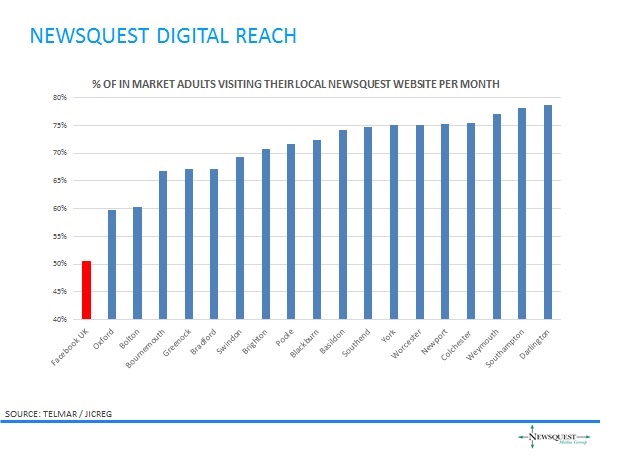Government Must Make More Use of Highly Trusted Local Media
Government must make more use of highly trusted local media with its unrivalled reach into local communities and safe brand environment, senior industry figures told a conference of 500 Government communicators.
Addressing delegates, Newsquest North managing director David Coates, The Northern Echo editor Andy Richardson, and Local Media Works head of marketing Justin Fenton told the audience that it would be a “huge mistake” for Government to communicate only through digital platforms such as Google and Facebook.
David told delegates, including Government Communications executive director, Alex Aiken: “I’m sure a theme running through the agenda for your conference over the last few days has been how social media is impacting everything in the communications field.
“It is certainly impacting regional media but I thought you might be interested to see how an old media business like the regional press compares with facebook in its reach into local communities. Here we can see Facebook is forecast to reach 51 per cent of the population in 2017.
David added: “But this graph shows the percentage reach of Newsquest’s websites in their local markets – you can see we’re leaving Facebook behind by some distance.”

In his presentation, Andy spoke about the proud campaigning history of The Northern Echo and the ways in which the newspaper is using digital technology to gain even more understanding about what readers want and reach greater audiences than ever before.
He added: “It would be a huge mistake to think that the best way forward is to use your own comms channels and spend a few quid with Facebook and Google to get your messages out there. Your local newspaper understands the local community. We have been here for more than a century – we’re not some fly-by-night social media business that avoids paying taxes.
“Regional newspapers are still a key part of the democratic process. Having a thriving local media is good for all of us – the Trump future with a media afraid to speak out does not bear thinking about. I am sure you would agree that Britain would be worse off if it lost its vibrant, regional press.
“But we need you to work in partnership with us. If you are planning a big comms launch then get your local paper involved as a partner not an observer.”
Justin briefed delegates on Featurelink and highlighted examples of strong campaigns highlighted by Local Media Works Making a Difference campaign. “Local newspapers don’t just report what’s going on in their area – they actively engage with the social and economic issues that matter to their readers and push for change,” Justin said.
“This makes local newspapers an incredibly powerful and engaging context for national advertisers to appear in. What’s more, local newspapers are safe environment for brands to appear in, free from the risks of blind programmatic which can see advertisers appear next to highly inappropriate content.”
Speaking about the strength of the industry, David said that the vast majority of closures in the industry recent years had been free newspapers launched in the 70s and 80s and that very few papers of record had closed.
David continued: “I think the regional press is starting from a position of strength. We’re profitable, we produce a solid operating margin and we have a huge and engaged audience.
“We’re building a leading position in local digital display advertising thanks to the power of our trusted brands, the engaging content we capture and in the depth of our relationships in the communities we serve. We also have more sales representation on the ground than anyone else.
“We have a clear strategy for transitioning our business from its print past to its digital future and we’re well on our way to a sustainable multi-media future.”
“And a great example of this sustainable model for the regional press can be found in our operations in York. Here we have a business where 32 per cent of its advertising revenue is generated on-line. Ten per cent of its revenues comes from local magazines and events and its content reaches 76 per cent of the adult population of the city of York.”